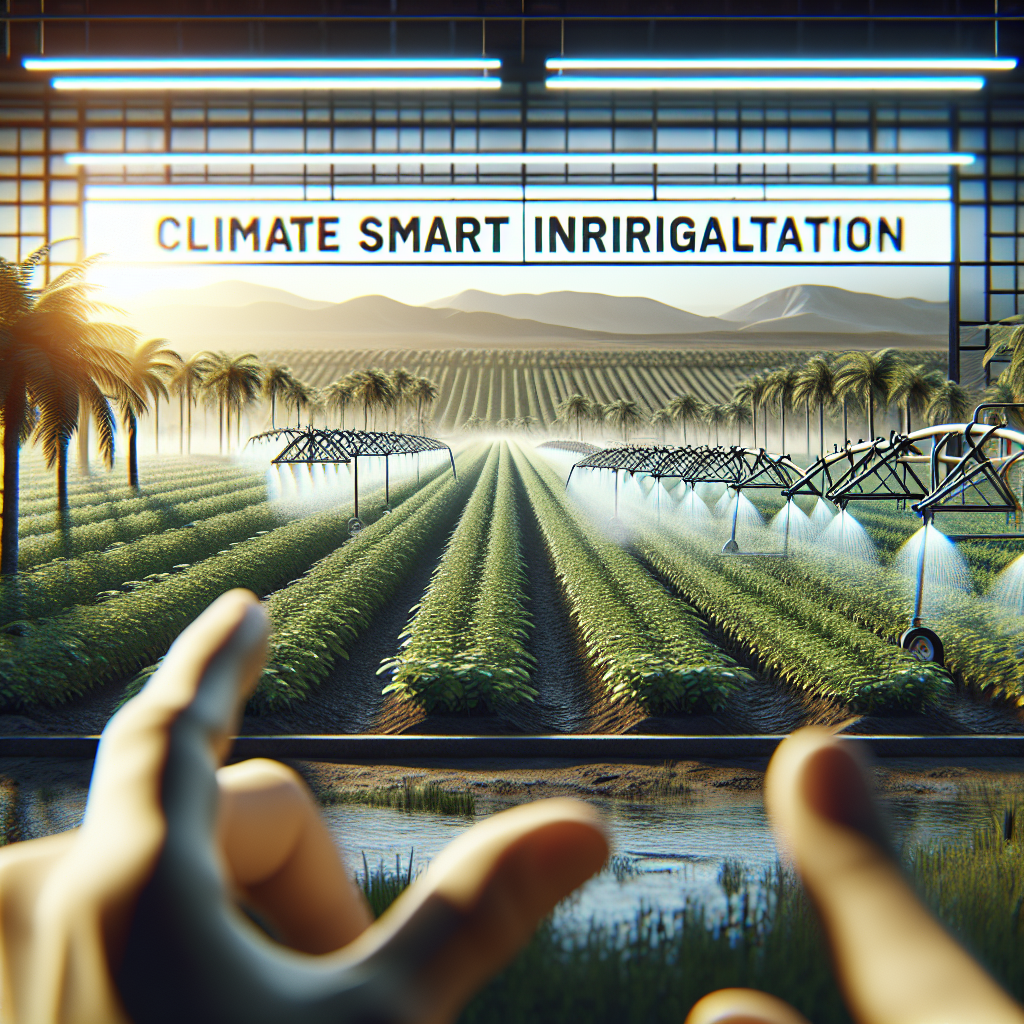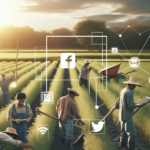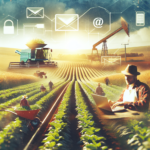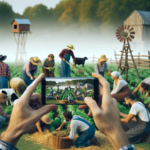Understanding the Smart Irrigation Method
Are you tired of seeing your water bills skyrocket every summer?
It’s no secret that traditional irrigation systems can often be wasteful, leading to overwatering or inefficient scheduling.
Thankfully, technology has come to rescue us from these challenges. Welcome to a new era of smart irrigation!
In this comprehensive guide, we’ll explore what smart irrigation is, its key components, and the various types of sensors used in these systems. We’ll also examine the numerous benefits these systems offer, the brilliant process of how they work, and introduce some leading examples in the market.
Finally, we’ll discover how this technology dovetails seamlessly with climate-smart agriculture and envision its promising future in agriculture.
So, let’s make a smart move and get started!
Table of Contents
Understanding the Smart Irrigation Method
What Is Smart Irrigation?
Smart irrigation is a technology-driven approach to watering landscapes and agricultural fields. It involves the use of sensors, controllers, and advanced algorithms to optimize water usage.
Traditional irrigation methods often waste water due to overwatering or inefficient scheduling. Smart irrigation aims to solve these issues by adapting to real-time data and specific environmental conditions.
Components of Smart Irrigation Systems
A smart irrigation system is composed of several key components:
- Sensors: Measure soil moisture, temperature, and other environmental factors.
- Controllers: Use data from sensors to adjust watering schedules dynamically.
- Weather Stations: Provide up-to-date meteorological data to the system.
- Mobile Apps: Allow users to monitor and control the system remotely.
Types of Sensors Used
The sensors in a smart irrigation system are essential for accurate data collection. Here are some common types:
- Soil Moisture Sensors: Measure the water content in the soil.
- Rain Sensors: Detect rainfall to prevent unnecessary watering.
- Temperature Sensors: Monitor the ambient temperature to adjust watering needs.
Benefits of Smart Irrigation
Implementing smart irrigation offers multiple advantages:
- Water Savings: Efficient water use reduces waste.
- Cost Savings: Lower water bills and reduced labor costs.
- Healthier Plants: Optimized watering promotes plant health.
- Environmental Impact: Conserves water resources and reduces runoff.
How Smart Irrigation Works
Smart irrigation systems work by integrating sensor data with weather forecasts and historical water usage patterns to create an optimal watering schedule. Here’s a simplified process:
| Step | Description |
|---|---|
| Data Collection | Sensors gather real-time environmental data. |
| Analysis | Controllers analyze the data and compare it with weather forecasts. |
| Decision | The system decides whether to water, how much water to use, and when to water. |
| Execution | Watering occurs based on the optimized schedule. |
Examples of Popular Smart Irrigation Systems
Several smart irrigation systems are leading in the market:
- Rachio: Offers Wi-Fi-enabled controllers and integrates with home automation systems.
- Rain Bird: Features advanced water-saving technologies and easy installation.
- Netro: Uses AI-driven scheduling and efficient water usage techniques.
For more in-depth information about smart irrigation systems, you can read this EPA guide on irrigation controllers.
Getting Started With Smart Irrigation
To start using smart irrigation, follow these steps:
- Evaluate your landscape and determine your watering needs.
- Choose a compatible smart irrigation system based on your requirements.
- Install sensors and controllers following the manufacturer’s guidelines.
- Integrate the system with any existing smart home setups if applicable.
- Monitor and adjust the settings regularly for optimal performance.
Climate-Smart Agriculture and Irrigation
Defining Climate-Smart Agriculture
Climate-smart agriculture (CSA) is a holistic approach to sustainable farming, designed to combat global climate change. The goal is improving crop productivity, reducing greenhouse gas emissions and enhancing resilience to environmental impacts. The concept of CSA factors in the inherent complexities and variations of agricultural systems within ecological, social, and economic contexts.
Connection Between CSA and Smart Irrigation
Smart irrigation plays an integral role in CSA. As part of an effective climate-smart farm management strategy, state-of-the-art watering systems help farmers adapt to changing weather patterns, reduce their water consumption, and improve agricultural productivity. CSA and smart irrigation systems go hand in hand, as conserving water and optimizing its use is one of the pillars of climate-smart agriculture.
Climate-Smart Irrigation Technologies
Several technologies are commonly used in climate-smart irrigation, demonstrating how these methods complement traditional smart irrigation systems:
- Drip Irrigation: It delivers water directly to the roots of plants, reducing water use by up to 60% compared to traditional methods.
- Sprinkler Irrigation: Ideal for large size farms and where sufficiently clean water is available.
- Fertigation: A hybrid of fertilization and irrigation, this ensures the direct application of water and nutrients to unlock maximum yields.
Advantages of Using Smart Irrigation in CSA
Incorporating smart irrigation technologies into a CSA strategy provides several benefits:
- Climate Resilience: Smart irrigation helps farmers adapt to shifting weather patterns due to climate change.
- Improved Harvest: Precise watering can lead to healthier plants and improved crop yields.
- Resource Efficiency: More efficient nutrient and water use reduces waste and saves money.
Climate-Smart Irrigation Best Practices
Farmers and gardeners can optimize their irrigation tactics to align with CSA principles. Here are some widely recommended actions:
- Matching irrigation schedules with plant needs and growth stages.
- Using a mix of sensor data, weather forecasts, and crop information to fine-tune watering schedules.
- Periodically checking and maintaining the irrigation system to ensure its proper functioning and efficiency.
For further insights on climate-smart agriculture and its relevance to irrigation, consider this comprehensive resource from the Food and Agriculture Organization of the United Nations.
Examples of Effective Smart Irrigation Systems
Home Garden Solutions
Smart irrigation systems are not just for large farms; they also cater to home gardens, offering user-friendly and efficient solutions.
- Orbit B-hyve: Features a weather-sensing system that automatically adjusts watering schedules. Its user-friendly app makes it easy to manage from your smartphone.
- SkyDrop: Utilizes a cloud-based control system to optimize watering schedules based on local weather forecasts and historical data, ensuring your plants get the right amount of water.
Commercial Agriculture Systems
For larger scale agricultural operations, smart irrigation systems integrate advanced technologies to handle complex watering needs.
- CropX: Combines soil sensors with a powerful analytics platform to create precise irrigation plans, conserving water while maximizing crop yields.
- Hortau: Uses real-time soil tension readings to deliver water exactly when and where it is needed, reducing water usage and improving plant health.
Municipal and Public Spaces
Cities and municipalities also benefit from smart irrigation systems to manage public spaces efficiently.
- HydroPoint: Known for its WeatherTRAK system, it brings efficient water management solutions to public parks, sports fields, and other municipal properties.
- Baseline Systems: Includes soil moisture sensors and predictive weather algorithms to adjust watering based on real-time data, helping cities save water and maintain green spaces.
Benefits of Smart Irrigation
Enhanced Efficiency
Smart irrigation systems are designed to water based on plant needs and environmental conditions. This precision leads to significant water and energy savings.
- Reduction in Overwatering: By using soil moisture sensors, the system waters only when necessary, cutting down excess water usage dramatically.
- Energy Efficiency: Since the system delivers water more effectively, it reduces the energy needed for pumping and distributing water.
Improved Crop Opportunities
Smart irrigation boosts productivity in agricultural settings through well-timed, adequate watering.
- Yield Consistency: Controlled watering leads to consistent crop growth, enhancing both quality and quantity of produce.
- Diverse Crop Adaptation: Farmers can efficiently manage multiple crops with varying water requirements using a single smart irrigation system.
Adaptability and Scalability
Smart irrigation systems can be tailored to suit different sizes and types of landscapes, making them practical for various applications.
- Versatility: Suitable for home gardens, commercial farms, and public spaces alike, these systems can meet the specific needs of diverse environments.
- Ease of Expansion: Additional sensors and controllers can be integrated seamlessly as needed, enhancing the system’s capacity and functionality.
Data-Driven Insights
One of the unique features of smart irrigation systems is their ability to collect and analyze data, providing actionable insights.
- Performance Metrics: Users can access detailed reports on water usage, system efficiency, and plant growth, aiding in fine-tuning the irrigation strategy.
- Predictive Maintenance: Data analytics can identify potential issues before they become serious problems, minimizing downtime and repair costs.
Environmental Stewardship
Sustainability is a core advantage of smart irrigation, benefitting both the environment and communities.
- Mitigation of Water Scarcity: Efficient water use ensures that scarce resources are conserved, which is crucial in regions facing water shortages.
- Reduction in Runoff and Erosion: Precise watering minimizes excess water that often leads to soil erosion and contamination of water bodies.
For comprehensive guidelines on smart irrigation benefits, check out the EPA guide on irrigation controllers.
Future of Smart Irrigation Technologies
Integration with IoT
The Internet of Things (IoT) is revolutionizing smart irrigation by connecting more devices and sensors for better data collection and management.
- Seamless Connectivity: IoT-enabled sensors and controllers can communicate with each other and central systems more effectively, ensuring real-time adjustments and optimized irrigation.
- Remote Monitoring and Control: Farmers and gardeners can manage their irrigation systems remotely via mobile apps, providing convenience and timely interventions.
AI and Machine Learning Applications
Artificial Intelligence (AI) and Machine Learning (ML) are enhancing the decision-making processes within smart irrigation systems.
- Predictive Analytics: AI algorithms can predict future watering needs by analyzing historical data and current conditions, further optimizing water use.
- Custom Recommendations: ML models can offer personalized irrigation schedules tailored to specific crops and soil types, improving the efficiency of water use.
Solar-Powered Smart Irrigation
The integration of solar power with smart irrigation systems is emerging as a sustainable and energy-efficient solution.
- Energy Independence: Solar-powered systems reduce reliance on grid electricity, making them suitable for remote and off-grid areas.
- Cost Reduction: With solar energy, operational costs decrease significantly, making smart irrigation more affordable and sustainable.
Regenerative Agriculture Practices
Combining smart irrigation with regenerative agriculture can further enhance soil health and sustainability.
- Soil Conservation: Smart irrigation supports techniques like crop rotation and cover cropping, maintaining soil structure and fertility.
- Biodiversity Promotion: By creating optimal watering conditions, these systems support diverse plant species, contributing to a healthier ecosystem.
For a deeper dive into climate-smart agriculture, visit the FAO’s climate-smart agriculture sourcebook.
Wrapping Up
In conclusion, smart irrigation systems stand as an innovative solution for effectively managing our water resources. By integrating advanced technologies like sensors, controllers, and algorithms, these systems maximize water efficiency, improving not just our agricultural productivity, but also the overall health of our landscapes.
Smart irrigation is a vital component in the increasingly relevant climate-smart agriculture practices, helping to adapt to changing environmental conditions while promoting resource efficiency and improved harvests. Additionally, the scalability and flexibility of such systems make them suitable for various applications, from home gardens to large-scale agricultural operations and public spaces.
With the ongoing advancements in Internet of Things, AI, and solar energy, the future of smart irrigation technologies appears promising. This progress strikes a fine balance between technological innovation and environmental stewardship, pointing us towards sustainable practices that benefit both our communities and our planet.
Frequently Asked Questions – FAQs
What is smart irrigation?
Smart irrigation is a technology-driven method of watering landscapes and agricultural fields efficiently. It uses a combination of sensors, controllers, and advanced algorithms to optimize water use based on real-time data and environmental conditions.
How does smart irrigation benefit the environment?
Smart irrigation systems focus on efficient water use, reducing waste and runoff that can result in accumulated soil erosion and contamination of water bodies. With global water scarcity an arising concern, these systems help conserve water resources.
Can I use smart irrigation in my home garden?
Absolutely! Smart irrigation systems are highly scalable and adaptable. They are practical not only for large agricultural fields but also for home gardens, public spaces, and various other applications.
What does the future hold for smart irrigation technologies?
The future of smart irrigation looks bright with the development of IoT and AI technologies. With more connected devices, better real-time data collection, predictive analytics, and personalized irrigation schedules, the efficiency and functionality of these systems will only improve. Incorporation of sustainable energy sources, like solar power, is also a significant step forward.






